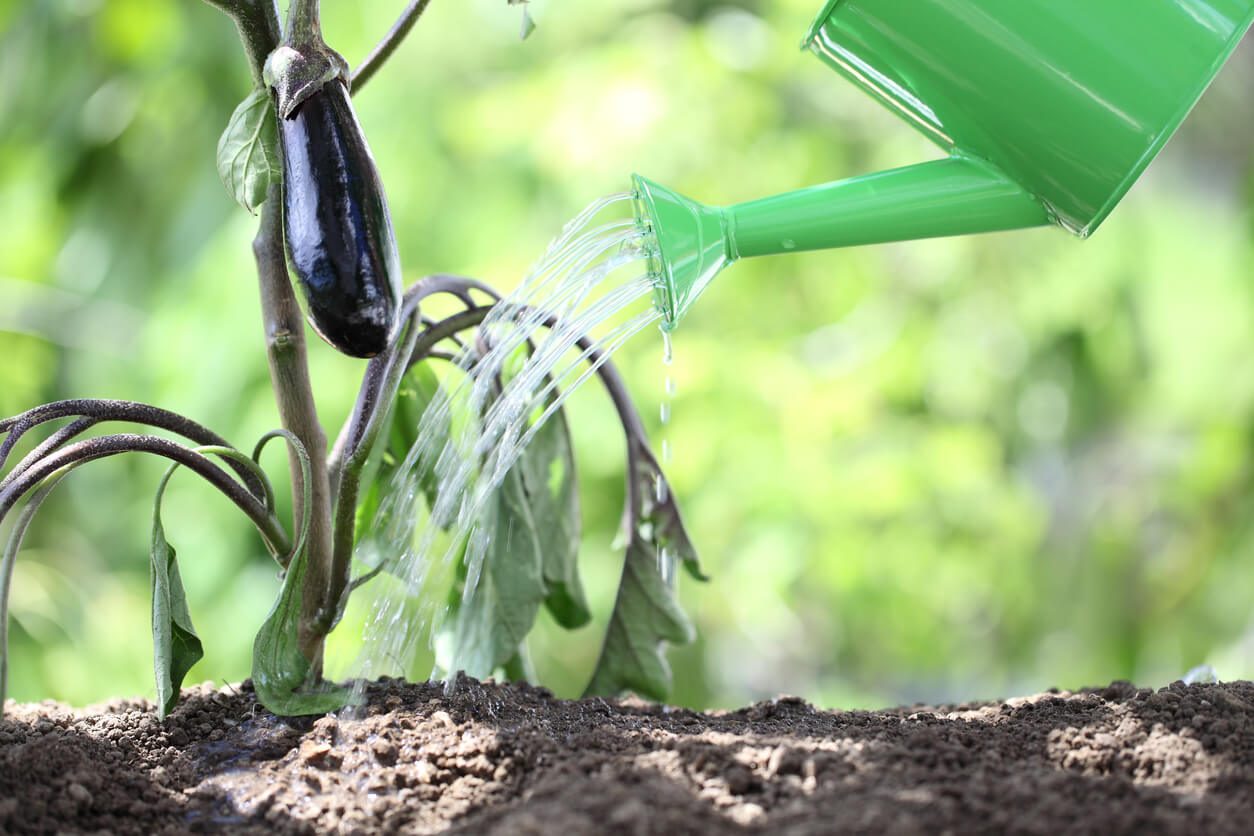
Gardener watering eggplant plant in garden
Water
Once your eggplants are nestled in—whether it’s in a container, a raised bed, or open ground—consistency is key when it comes to watering. Eggplants need at least 1 inch of rain every week. One way to check on this, is to leave an old coffee can out in your garden to see how much rain accumulates. Eggplants want soil that’s consistently moist, but not soggy. Don’t kill your eggplants with kindness. Water, yes—just not too much.
If you’re not getting consistent rainfall, you’ll want to water deeply about once a week, so your plants get about an inch of water. Eggplants prefer a deep soak over short frequent soaks, which will give them shallow roots. A little struggle will make them root deeper. If the top of the soil is a little dry, lay down a layer of mulch to help retain moisture; ground-up leaves, clean grass clippings (no pesticides), or compost work well. Without enough water, your eggplants will be small and bitter.
It’s always best to water early in the morning, so your plants can soak up the water and put it to work. Watering earlier in the day also gives the sun time to burn off any water on the leaves, which can lead to disease if they stay wet. When you do water, aim for the base of the plant. Try not to get the leaves wet if you can, (unless you’re blasting off pests); that can open the plant to fungal infection.
Weeding
If you’ve planted in containers, weeds shouldn’t be much of a problem. If you do see weeds, pull them early and often—but be gentle about it. Loosen the soil gently around your plants, especially when they’re young, so you don’t disturb their roots. For containers, this is another good reason to get yourself some fresh garden soil; it’s one less piece of aggravation to deal with during the growing season.
But even if you’re growing your eggplants in raised beds or directly in the ground, properly preparing your soil is still an excellent preventive measure against the emergence of weeds. When you till or cultivate the area where you’ll plant your eggplants, remove weeds and debris. You can also amend your garden bed with a little commercially available garden soil. Give your eggplants all the advantages you can to ensure a healthy crop.
If weeds spring up around your eggplants during the growing season, work the soil around the base of the plants with a hoe or hand rake—only deep enough to kill the weeds and not damage the plant’s roots.
Fertilizer
Eggplants like a slow released type of fertilizer best. If you already have healthy, nutrient-rich soil like you would with a new container filled with amended potting soil, you shouldn’t need fertilizer. If you’ve had your soil tested, you have a detailed breakdown of your soil composition, along with recommendations for any necessary amendments.
Potassium deficiency is always a problem with fruiting plants, and eggplants are no exception. Calcium deficiency is, however, most obvious, which you’ll notice when you get blossom end rot. Without calcium, tissues break down, and the eggplants will show with rotting bottoms. That said, too much potassium can also cause calcium deficiency. Therefore, soil testing is key to find out the true numbers.
Boron deficiency is also common in fruiting plants and it’s responsible for pollen growth, fruit set, and seed development, amongst other important roles. You can usually spot boron deficiency when your plants are stunted and turning reddish or yellow. If you’ve had your soil tested and it calls for the addition of boron, amend the soil with 1 1/2 teaspoons per square yard of soil before you plant. However, if your eggplants are already growing you can sprinkle the borax along each row. It’s not a lot, but it helps them grow well.
If you feel your plants aren’t flourishing, you can apply any good 10-10-10 fertilizer. Just be sure to follow the application directions.
How often do you have to fertilize or water your eggplants? Do you have any challenges growing eggplants? Please tell us your tips for nurturing healthy eggplants.


 Previous
Previous

